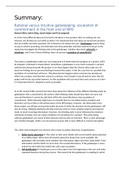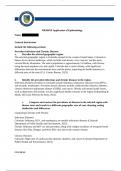Samenvatting
Summary Eliëns (2018): Rational versus intuitive gatekeeping: escalation of commitment in the front end of NPD
The document contains a summary of the article of Eliëns (2018), Rational versus intuitive gatekeeping: escalation of commitment in the front end of NPD. The full article has been summarized. The summary has been writen in such a way that is easy to read and contains all the main findings of the ...
[Meer zien]





